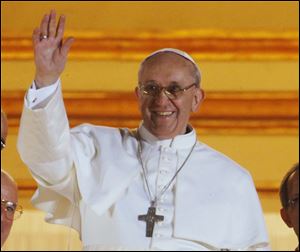
Even the American liberals have happily accepted Francis as a herald of something new for the Church, from which they did not expect anything new.
The mixture that the pope represents — left in social issues and right in moral ones — is something exotic in U.S. politics. The Democratic Party is unequivocally leftist, while the Republican one is unequivocally rightist.
Theoretically, then, it is difficult to find somebody in America who would be able to identify with such a weirdo as Francis. The liberals should reject him for his moral conservatism, and the conservatives for the fact that he has criticized capitalism.
But yesterday it could be felt that both parties fell under Francis’ charm and decided to, at least conditionally, turn a blind eye to his faults.
The U.S. media have picked up on reports about the extraordinary modesty of the pope, who in Buenos Aires did not live in an episcopal palace but in an ordinary apartment, cooked his own meals and took the bus. In this he is similar to — it was repeated — St. Francis of Assisi, who gave up wealth.
“This is a man whose life is rooted in the gospel .… So they took a Jesuit to take his name, Francis, to help rebuild and heal the church because there are some divisions and some hurts. But I think most — what the cardinals wanted to present us with is this great pastoral man, known with the poor, with the disenfranchised, with those who are living in irregular situations .… Here is a pope that is going to come in and look at a situation, take it back to basics,” explained the Canadian priest Thomas Rosica, Vatican press secretary, to CNN. Other commentators noted that Cardinal Bergoglio visited slums and those affected with AIDS.
“A Latino. One of us .… He’s the first pope from the Americas. He’s a Jesuit, who are known for their work with the poor. He was warm and humble, softly asking the crowd to pray for him. And urging them: ‘We’re going to walk this road together.’ … But, although he has fought against corruption in his own diocese, he’s also known as a traditionalist who has not been eager for major change in church policy. That dampens my enthusiasm. But for the moment, I’m willing to take those first steps with the man who chose to be named after a simple friar,” wrote Ralph De La Cruz, a Texan journalist, in The Dallas Morning News.
This is a typical position for many Catholics from the U.S., who identify with the Church but at the same time reject some of its doctrines. As many as 82 percent of American Catholics think that contraception is morally acceptable. One of them is Vice President Joe Biden, who will represent the U.S. at the official inauguration Mass at the Vatican on March 19.
President Barack Obama, who states that he is a Christian without any affiliation with a particular church, also appreciated the pope’s Franciscan virtues: “On behalf of the American people, Michelle and I offer our warm wishes to His Holiness Pope Francis .… As a champion of the poor and the most vulnerable among us, he carries forth the message of love and compassion that has inspired the world for more than 2,000 years — that in each other we see the face of God.”
American conservatives have waited for someone like this. A day before the election of the new pope, Michael Winters wrote in The Wall Street Journal: “Pope Benedict XVI had a penchant for elaborate, baroque dress. He did this, as I understand it, because of his commitment to the ideal of beauty in the church’s liturgy. But a simpler attire can be beautiful too, and it wouldn’t make a parent struggling to feed her children wonder why so much money is spent on luxuries. The new pope will be the Bishop of Rome. Like many bishops throughout the world, he can make time to go to soup kitchens and serve the poor, visit the infirm in hospitals and go to local prisons, spending time with those whom the rest of the world tends to shun.”
Journalist for The Wall Street Journal, Peggy Noonan, wrote: “The next pope should be a man who can greet the world with a look of pleasure on his face, with a smile of joy. He should not come forward with the sad, bent posture of one who knows the world is in ruins and only the facades remain.”
When the next day Francis appeared in front of the world in a modest, white cassock, one felt as though Winters and Noonan were prophets. Other commentators praised the unpretentiousness of the pope, who greeted believers with a simple “Buonasera” — “Good evening” — and did not for a moment sound pompous.
More serious questions were only raised by newspapers that had more time for reflection and familiarizing themselves with the life of Cardinal Bergoglio. The New York Times maliciously notes that he loudly protested when Argentina legalized same-sex marriages in 2010, but remained silent during the dictatorship of generals who committed many crimes in the ‘70s.
Of course, American liberals reading The New York Times and The New Yorker would prefer someone who would open the path to priesthood for women, accept gays, contraception, etc. But they were pleasantly surprised even by the conservative Cardinal Bergoglio; they had expected nothing new from the Catholic Church, compromised in the U.S. by the many cases of child molestation by priests.

Leave a Reply
You must be logged in to post a comment.